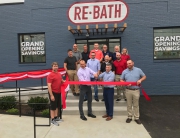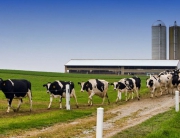Fund to help keep land in families has nearly doubled
Intelligencer Journal
July 24, 2008
BY P.J. REILLY, Intelligencer Journal Staff
David and Ruthie Blank want to become part of Lancaster County’s next generation of farmers.
Since 2001, the couple has rented a 70-acre farm in Salisbury Township from David’s parents to run a 52-cow dairy.
Thanks in part to a government loan program, the Blanks soon will own that farm.
Wednesday, the Blanks were accepted by Lancaster County Commissioners into the Next Generation Farmer Loan Program and will receive a reduced-interest loan for $310,000 to put toward the farm’s $650,000 purchase price.
The goal of the program is to help farm operations transition from one generation to the next, thereby ensuring that farming remains a viable business in Pennsylvania.
Five other farm families also were accepted into the loan program by the commissioners Wednesday — the most ever brought before the board in a single week.
According to Lyle Hosler, project manager for Economic Development Company of Lancaster County, which administers the loan program here, the demand for the program, started in 1998, always has been strong in the county.
But interest has grown this year thanks to a provision in the 2008 Farm Bill approved by Congress last month, which nearly doubled the amount farmers can apply for in reduced-interest loans, from $250,000 to $450,000.
“We’ve seen a lot of activity because of the increase,” Hosler said. “Obviously, $250,000 doesn’t go a long way for buying farmland here in Lancaster County. “But $450,000 can have a real impact.”
Under the program, banks are exempt from federal, state and county income taxes owed on the interest earned from loans made to first-time farm buyers.
That tax exemption allows banks to offer the loans to farmers at a reduced interest rate — 1 percent to 2 percent less than the normal lending rate, according to Hosler.
“The unique partnership between farmers, lenders and county economic development agencies will assist next-generation farmers and their families to begin and preserve our farm enterprises,” Dennis C. Wolff, secretary of Pennsylvania Department of Agriculture, wrote in a letter describing the program.
“A strong agriculture also provides economic and societal benefits to communities, which enhance the quality of life for everyone.”
The state government sets a cap on the total amount in tax-exempt loans that can be issued across Pennsylvania each year.
Lancaster County leads the state in cashing in on the loan program.
Last year, 12 local farmers drew down all $3 million allocated by the state.
For this year, the state has doubled the allocation to $6 million, according to Hosler.
“It went up due to the increased activity and the request that more farmers could use this if more was available,” he said.
So far this year, 17 Lancaster County farmers have been approved for $4.5 million in loans under the Next Generation Farmer Loan Program.
Hosler is processing two more applications from local farmers seeking a total of $750,000. He expects to bring those requests to the county commissioners within the next month.
Two farmers in Juniata County, who have received a combined total of $500,000 in loans, are the only farmers outside Lancaster County to receive loans through the program this year.
“This is something that has really caught on here,” Hosler said. “The process works well enough that I believe people feel comfortable with it and they take advantage of it.”
Email: preilly@lnpnews.com
copyright ©2008 Intelligencer Journal. Used with permission.
For additional information or with questions about the Next Generation Farmer Loan Program, email
Lyle Hosler, project manager at EDC Finance Corporation, or call him at 717-397-4046






Recent Comments